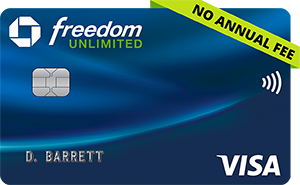Understanding the Redemption Options for Your Chase Freedom Unlimited® Rewards
The Chase Freedom Unlimited® card's appeal lies in its straightforward cash back rewards. However, the rewards are actually earned as Chase Ultimate Rewards points, which unlock a variety of redemption options beyond simple cash back. Knowing how to leverage these options is key to maximizing the value of the rewards you earn on your everyday spending.
For a comprehensive overview of how to maximize your card's earning potential, read our pillar page, Maximizing Your Rewards with the Chase Freedom Unlimited®.
The standard redemption: Cash back
For many cardholders, the most direct and simple redemption option is cash back.Leveraging gift card redemptions
Gift cards are another popular redemption option and can sometimes offer an enhanced value.Redeeming for travel through the Chase Travel portal
You can also use your points to book travel directly through the Chase Ultimate Rewards portal.Unlocking premium redemptions through a combination strategy
The true potential of your Chase Freedom Unlimited® rewards is unlocked when you pool your points with a premium Chase card, such as the Chase Sapphire Preferred® or Chase Sapphire Reserve®.Using points with retail partners
Chase also allows you to redeem points for purchases with certain retail partners, such as Amazon.The bottom line
The Chase Freedom Unlimited® offers flexible redemption options, from the simplicity of cash back to the high-value potential of premium travel redemptions when paired with another Chase card. Understanding these options is key to tailoring your rewards strategy to your personal financial and travel goals.Ready to apply?

Chase Freedom Unlimited®
Related Articles
Found this guide helpful? Bookmark it for future reference as you continue your financial journey!
Experian Boost: A Comprehensive Guide to Boosting Your Free Credit Score
FICO® Credit Scores
FICO® Score Ranges:
- Exceptional: 800–850
- Very Good: 740–799
- Good: 670–739
- Fair: 580–669
- Poor: 300–579
What is a Credit Score?
A credit score is a three-digit number, typically ranging from 300 to 850, that predicts your creditworthiness—how likely you are to repay borrowed money on time. Lenders use this score to assess the risk of lending to you and to determine the interest rates and terms of any credit you might receive.
Why is a Credit Score Important?
A credit score is important because it acts as your financial reputation. Lenders, landlords, insurers, and employers use this single number to quickly judge how reliable you are with money. A higher score helps you qualify for loans and credit cards, often securing lower interest rates that can save you significant money. Conversely, a poor credit score can lead to application denials or much higher costs for borrowing, making it a key factor in your overall financial opportunities.
FICO® Credit Score Facts
- Three-Digit Number: Like other credit scores, FICO® Scores are a three-digit number that summarizes a consumer's credit risk.
- Range: Most standard FICO® Scores range from 300 to 850. Higher scores indicate lower credit risk.
- Data Source: FICO® Scores are calculated using data from your credit reports maintained by the three major credit bureaus: Experian, Equifax, and TransUnion. Your score may vary slightly depending on which bureau's data is used.
- Industry Standard: Lenders rely on FICO® Scores for mortgages, auto loans, and credit cards because they provide a consistent, statistically sound assessment of the likelihood that a borrower will repay their debt.
Note: Credit scores are used to represent the creditworthiness of a person and may be one indicator to the credit type you are eligible for. However, credit score alone does not guarantee or imply approval for any credit card product.
